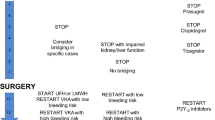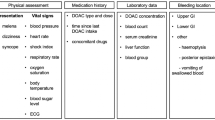Abstract
Background: The antifibrinolytic agent aprotinin is used to limit blood loss in cardiac surgery. In a recently performed multicentre observational study, the use of aprotinin was dose-dependently associated with a higher risk of renal failure and cardiovascular events.
Objective: Therefore, the aim of this study was to evaluate the impact of low-dose aprotinin (2 million kallikrein-inhibitor units) on safety variables in a large single-centre investigation in patients who underwent coronary artery bypass graft (CABG) surgery.
Methods: Clinical outcome variables such as renal failure, myocardial infarction, gastrointestinal failure, neurological complications and in-hospital mortality were assessed in 2436 CABG surgery patients, whereof 1162 patients received low-dose aprotinin perioperatively and 1274 patients did not receive aprotinin. Statistical analysis was performed using multivariable logistic regression.
Results: In patients receiving aprotinin, the odds ratios of experiencing one of the aforementioned adverse events were not significantly different from the patients who did not receive aprotinin (p = 0.136-0.288). Moreover, the need for rethoracotomy did not differ between the two groups (p = 0.129). However, the use of low-dose aprotinin reduced the risk of peri-and postoperative use of packed red blood cells by 39% and was associated with a mean reduction in postoperative blood loss of 201 mL compared with patients who did not receive aprotinin (p <0.001). Mean total blood loss in the aprotinin group and the control group was 875 mL (standard deviation [SD]: 757 mL) and 1105 mL (SD: 867 mL), respectively (p < 0.001). In a sub-analysis in 2049 patients undergoing their first cardiac surgery and undergoing CABG using the internal mammary artery, efficacy and safety data of aprotinin were similar to the results of the entire study cohort of 2436 patients.
Conclusions: Our data indicate that low-dose aprotinin efficiently reduces blood loss and does not adversely affect relevant safety variables in CABG surgery.





Similar content being viewed by others
References
Sedrakyan A, Treasure T, Elefteriades JA. Effect of aprotinin on clinical outcomes in coronary artery bypass graft surgery: a systematic review and meta-analysis of randomised clinical trials. J Thorac Cardiovasc Surg 2004; 128: 442–8
Sedrakyan A, Wu A, Sedrakyan G, et al. Aprotinin use in thoracic aortic surgery: safety and outcomes. J Thorac Cardiovasc Surg 2006; 132: 909–17
Royston D, Levy JH, Fitch J, et al. Full-dose aprotinin use in coronary artery bypass graft surgery: an analysis of perioperative pharmacotherapy and patient outcomes. Anesth Analg 2006; 103: 1082–8
Kincaid EH, Ashburn DA, Hoyle JR, et al. Does the combination of aprotinin and angiotensin-converting enzyme inhibitor cause renal failure after cardiac surgery? Ann Thorac Surg 2005; 80: 1388–93
Karkouti K, Beattie WS, Dattilo KM, et al. A propensity score case-control comparison of aprotinin and tranexamic acid in high-transfusion-risk cardiac surgery. Transfusion 2006; 46: 327–38
Mangano DT, Tudor IC, Dietzel C. Multicenter study of Perioperative Ischemia Research Group and the Ischemia Research and Education Foundation: the risk associated with aprotinin in cardiac surgery. New Engl J Med 2006; 354: 353–65
Mangano DT, Miao Y, Vuylsteke A, et al. Mortality associated with aprotinin during 5 years following coronary artery bypass graft surgery. JAMA 2007; 297: 471–9
Ferguson TB. Aprotinin: are there lessons learned? JAMA 2007; 297: 527–9
Coleman CI, Rigali VT, Hammond J, et al. Evaluating the safety implications of aprotinin use: the retrospective evaluation of aprotinin in Cardio Thoracic Surgery (REACTS). J Thorac Cardiovasc Surg 2007; 133: 1547–52
Schönberger JP, Everts PA, Ercan H, et al. Low-dose aprotinin in internal mammary artery bypass operations contributes to important blood saving. Ann Thorac Surg 1992; 54: 1172–6
Santamaria A, Mateo J, Oliver A, et al. The effect of two different doses of aprotinin on hemostasis in cardiopulmonary bypass surgery: similar transfusion requirements and blood loss. Haematolgica 2000; 85: 1277–84
Liu B, Belboul A, Larsson S, et al. Factors influencing haemostasis and blood transfusion in cardiac surgery. Perfusion 1996; 11: 131–43
Brown JR, Nancy JO, O’Connor GT. Meta-analysis comparing the effectiveness and adverse outcomes of antifibrinolytic agents in cardiac surgery. Circulation 2007; 115: 2801–13
Henry DA, Carless PA, Moxey AJ, et al. Anti-fibrinolytic use for minimising perioperative allogeneic blood transfusion. Cochrane Database Syst Rev 2007; Oct 17: CD001886
Furnary AP, Wu Y, Hiratzka LF, et al. Aprotinin does not increase the risk of renal failure in cardiac surgery patients. Circulation 2007; 116: 1127–33
Hiatt WR. Observational studies of drug safety: aprotinin and the absence of transparency. New Engl J Med 2006; 355: 2171–3
Gummert JF, Funkat A, Krian A. Cardiac surgery in Germany during 2004: a report on behalf of the German Society for Thoracic and Cardiovascular Surgery. Thorac Cardiovasc Surg 2005; 53: 391–9
Fergusson DA, Hébert PC, Mazer CD, et al. A comparison of aprotinin and lysine analogues in high-risk cardiac surgery. N Engl J Med 2008; 358: 2319–31
Acknowledgements
No sources of funding were used to assist in the preparation of this study. The authors have no conflicts of interest that are directly relevant to the content of this study
Author information
Authors and Affiliations
Corresponding author
Rights and permissions
About this article
Cite this article
Kluth, M., Lueth, J.U., Zittermann, A. et al. Safety of Low-Dose Aprotinin in Coronary Artery Bypass Graft Surgery. Drug-Safety 31, 617–626 (2008). https://doi.org/10.2165/00002018-200831070-00007
Published:
Issue Date:
DOI: https://doi.org/10.2165/00002018-200831070-00007




